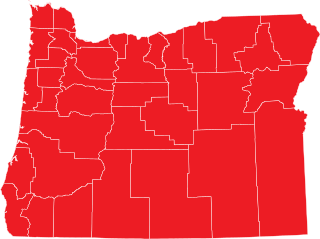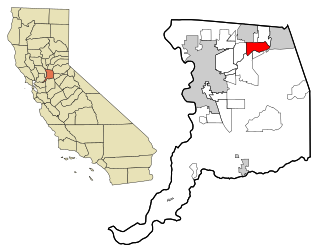
Proposition 53 was a California ballot proposition on the October 7, 2003, special recall election ballot. It failed to pass with 3,020,577 (36.2%) votes in favor and 5,318,065 (63.8%) against. It was placed on the ballot by a vote of the state legislature on Assembly Constitutional Amendment 11.

Proposition 56 was a California ballot proposition on the March 2, 2004 ballot. It failed to pass with 2,185,868 (34.3%) votes in favor and 4,183,188 (65.7%) against. It was intended to penalize the state's elected officials for every day that the state budget is overdue. The proposition would also have lowered the threshold required pass a budget and enact new budget-related taxes to 55% from the two-thirds supermajority vote currently required.. Prop 56 was officially known as the Budget Accountability Act.

Oregon ballot measure 48 was one of two unsuccessful ballot measures sponsored by the Taxpayers Association of Oregon (TAO) on the November 7, 2006 general election ballot. Measure 48 was an initiated constitutional amendment ballot measure. Oregon statute currently limits state appropriations to 8% of projected personal income in Oregon. If Governor declares emergency, legislature may exceed current statutory appropriations limit by 60% vote of each house. This measure would have added a constitutional provision limiting any increase in state spending from one biennium to next biennium to the percentage increase in state population, plus inflation, over previous two years. Certain exceptions to limit, including spending of: federal, donated funds; proceeds from selling certain bonds, real property; money to fund emergency funds; money to fund tax, "kicker," other refunds were included in the provisions of the measure. It also would have provided that spending limit may be exceeded by amount approved by two-thirds of each house of legislature and approved by majority of voters voting in general election.

California's state elections were held November 2, 2004. Necessary primary elections were held on March 2. Up for election were all the seats of the State Assembly, 20 seats of the State Senate, and sixteen ballot measures.

California's state elections were held November 3, 1992. Necessary primary elections were held on March 3. Up for election were all the seats of the State Assembly, 20 seats of the State Senate, and fifteen ballot measures.

The 75th Oregon Legislative Assembly convened beginning on January 12, 2009, for its biennial regular session. All of the 60 seats in the House of Representatives and half of the 30 seats in the State Senate were up for election in 2008; the general election for those seats took place on November 4.

The California state special elections, 2009 were held on May 19, 2009 throughout the state of California. The elections were authorized by the State Legislature and Governor Arnold Schwarzenegger as a part of a budget signed into law on February 19, 2009. Voters voted on six ballot propositions, 1A through 1F, for the open 26th State Senate district seat, and in a primary for the open 32nd congressional district seat. All of the propositions except 1F were defeated.

Proposition 1B was a defeated California ballot proposition that appeared on the May 19, 2009 special election ballot. The measure was legislatively referred to the ballot by the State Legislature. If passed it would have secured additional funding for primary education. Additionally, Proposition 1B would have only passed if Proposition 1A passed as well.

Proposition 1C was a defeated California ballot proposition that appeared on the May 19, 2009 special election ballot. The measure was a legislatively referred constitutional amendment that would have made significant changes to the operation of the State Lottery.

Proposition 1D was a defeated California ballot proposition that appeared on the May 19, 2009 special election ballot. The measure was legislatively referred by the State Legislature. If approved, the proposition would have authorized a one-time reallocation of tobacco tax revenue to help balance the state budget.

Proposition 1E was a defeated California ballot proposition that appeared on the May 19, 2009 special election ballot. The measure was legislatively referred by the State Legislature. If passed Proposition 1E would have authorized a one-time reallocation of income tax revenue to help balance the state budget.

Proposition 1F of 2009 was a measure approved by California voters relating to the salaries of state officers. It was an amendment of the Constitution of California prohibiting pay raises for members of the State Legislature, the Governor, and other state officials during deficit years. It was proposed by the legislature and approved in a referendum held as part of the May 19, 2009 special election ballot, in which the California electorate also voted on five other propositions.

The California state elections, November 2010 were held on November 2, 2010.

The California state elections was held on Election Day, November 6, 2012. On the ballot were eleven propositions, various parties' nominees for the United States presidency, the Class I Senator to the United States Senate, all of California's seats to the House of Representatives, all of the seats of the State Assembly, and all odd-numbered seats of the State Senate.

Proposition 30, officially titled Temporary Taxes to Fund Education, is a California ballot measure that was decided by California voters at the statewide election on November 6, 2012. The initiative is a measure to increase taxes to prevent US$6 billion cuts to the education budget for California state schools. The measure was approved by California voters by a margin of 55 to 45 percent.

In California state elections, 2014 was the first year in which the top statewide offices were elected under the nonpartisan blanket primary, pursuant to Proposition 14, which passed with 53% voter approval in June 2010. Under this system, which first went into effect during the 2012 election year, all candidates will appear on the same ballot, regardless of party. In the primary, voters may vote for any candidate, regardless of their party affiliation. The top two finishers, regardless of party, then advance to face each other in the general election in November.
The 2010 Virginia State Elections took place on Election Day, November 2, 2010, the same day as the U.S. House elections in the state. The only statewide elections on the ballot were three constitutional referendums to amend the Virginia State Constitution. Because Virginia state elections are held on off-years, no statewide officers or state legislative elections were held. All referendums were referred to the voters by the Virginia General Assembly.

California state elections in 2018 were held on Tuesday, November 6, 2018, with the primary elections being held on June 5, 2018. Voters elected one member to the United States Senate, 53 members to the United States House of Representatives, all eight state constitutional offices, all four members to the Board of Equalization, 20 members to the California State Senate, and all 80 members to the California State Assembly, among other elected offices.







